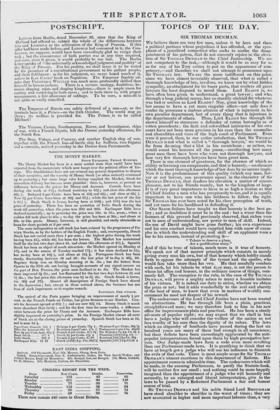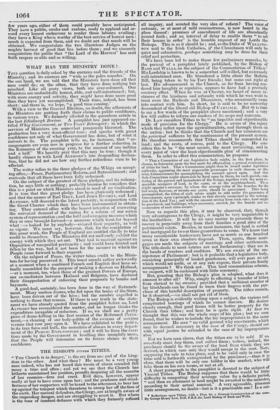TOPICS OF THE DAY.
SIR THOMAS DENMAN.
WE believe there are very few men, unless it be here and there a political partisan whose prejudices it has offended, or the syco- phant of a jaundiced competitor who seeks to soothe the disap- pointment of his patron, that do not sincerely rejoice in the eleva- tion of Sir THOMAS DENMAN to the Chief Justiceship. We are not competent to the task,—although it would be as easy for us as for any of his Tory critics to put on the appearance of com- peteney,—and therefore we shall not attempt to pronounce upon Sir THOMAS'S law. We are the more indifferent on this point, since we have almost invariably observed, that what is called a thorough knowledge of law, involves, we know not by what hidden sympathy, an attachment for its baser parts, that renders all great lawyers the least disposed to mend them. Lord ELDom is, we have often been given to understand, a great lawyer; and who, through along judicial career, has so sturdily stickled for whatever was bad or useless as Lord ELDoN? Nay, great knowledge of the law seems to have a yet more singular effect—not only does it render its possessor a zealous admirer of what is injurious in his own peculiar department, but of every thing that is injurious in the departments of others. Thus, Lord EL DON has through life shown himself as strenuous a defender of rotten boroughs as of rotten precedents ; the dark and cobwebbed intricacies of his own court have not been more precious in his eyes than the anomalies and absurdities and vices of the high court of Parliament. Even were it proved, then, to our entire satisfaction, that Sir THOMAS DENMAN is not what is called a " thorough lawyer," we would be far from deeming that a blot in his escutcheon ; or rather, we would count his honours all the purer,—recollecting how many great men there have been who were not thorough lawyers, and how very few thorough lawyers have been great men. There is one element of greatness, for the absence of which no ability or learning can compensate, and that is honesty,—an element which the most thorough knowledge of law does by no means imply. Now it is the predominance of' this quality (which any man, law- yer or not lawyer, can pronounce upon) in the character of Sir THOMAS DENMAN, that renders his elevation a matter of sincere pleasure, not to his friends merely, but to the kingdom at large. It is of very great importance to have in so high a station as that of Chief Justice a man who has perspicacity to see, and it is equally important to have one who has boldness to follow, the right. Sir THOMAS has ever been noted for his clear perception of truth, and yet more for his hardihood in defending it. Our Saxon fathers have taught us that honesty is the best po- licy; and so doubtless it must be in the end : but a wiser than the framers of this proverb had previously observed, that riches were not to men of understanding, nor power to men of skill. Indeed, the son of David might have gone further; his own experience and his own conduct would have supplied him with enow of exam- ples in which the understanding and skill of an applicant were a bar to his success, instead of promoting it- " Talents to deserve a place, Are a qualification saucy."
And if this be true of talents, much more is it true of honesty. We speak not of that narrow principle which consists in merely giving every man his own, but of that honesty which boldly stands forth to oppose the attempts of the tyrant and the spoiler, who would fain take more than his qwn. He that manfully combats with such, let his talents be what they may, is not the person to whose lot office and honour, in the ordinary course of things, com- monly fall. The exception to the rule, in the case of Sir THOMAS DENMAN, will prove a mighty solace to many a humble imitator of his virtues. It is indeed our duty to strive, whether we obtain the prize or not; but it adds wonderfully to the zeal and alacrity of the best of men, to know that even in matters of worldly con- cernment he need not despair of his reward.
The endeavours of the Lord Chief Justice have not been wasted on abstractions. He has through life been a plain, practical, straightforward man; we may therefore look to him in his new office for improvements plain and practical. He has been a steady advocate of popular right; we may expect that we shall in him have a judge who will consider the welfare of the nation as not less worthy of his care than the dignity of its rulers. The laws which an oligarchy of landlords have passed during the last six hundred years are many of them bad enough in all conscience; but their defects have been exceedingly aggravated by the anti- popular interpretations forced upon them by high prerogative law- yers. Our Judge-made laws form a code even more revolting than our Parliament-made laws. It is gratifying to think that we have at length got a judge who will use his influence to diminish the evils of that code. There is most ample scope for Sir THOMAS DENAIAN'S utmost exertions in this department of Reform. His appointment comes in admirable time. The endeavours which will be made, in the ensuing Parliament, to purify the Statute-book, will be neither few nor small ; and nothing could be more happily imagined than the appointment of a judge who will honestly and earnestly, by an enlarged and liberal interpretation, give to the laws to be passed by a gefortned Parliament a fair and honest course of trial.
Sir THOMAS DENMAN and his noble friend Lord BROUGHAM have stood shoulder to shoulder in the worst of times; they are now associated in higher and more important labours than, a very few years ago, either of t,hem could possibly have anticipated. They have a public, awake and zealous, ready to applaud and se- cond every holiest endeavour to render those labours availing; they have a King who is worthy of the best service of honest men : much is expected from them, and we doubt not that much will be obtained. We congratulate the two illustrious Judges on the mighty harvest of good that lies before them • and we sincerely congratulate the public that "the Lord of the Harvest" has sent forth reapers so able and so willing.



























 Previous page
Previous page